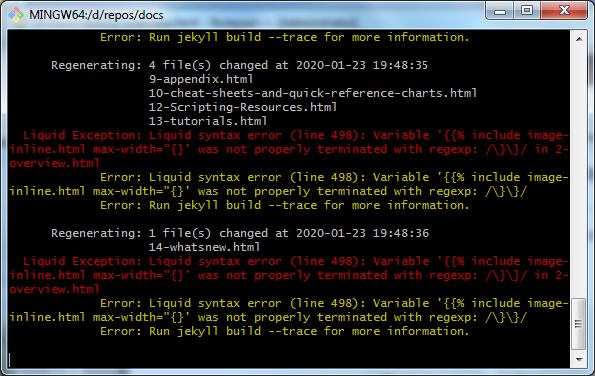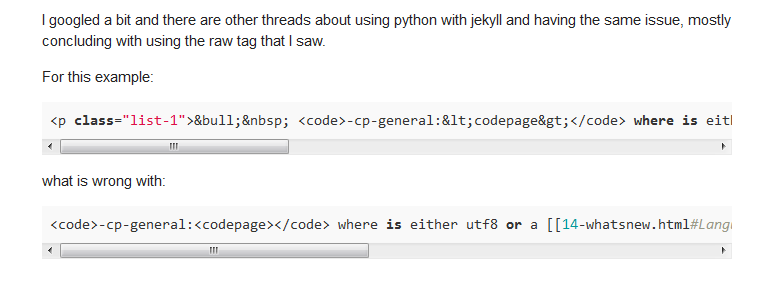What prompted this question:
Input
<p>Testing Text in an HTML document</p>
<p class="list-1">• {% raw %}<code>-cp-general:<codepage></code>{% endraw %} where is either utf8 or a <a href="14-whatsnew.html#Languages">codepage number</a>. NOTE: It should not be necessary to override this.</p>
<p class="list-1">• {% raw %}<code>-<gamemode></code>{% endraw %} Specifies which game mode to use. {% raw %}<code><gamemode></code>{% endraw %} can be any of the following: ['tes5vr', 'fo4vr', 'tes4', 'tes5', 'enderal', 'sse', 'fo3', 'fnv', 'fo4', 'fo76'] Example {% raw %}<code>-fo76</code>{% endraw %} for Fallout 76.</p>
<p class="list-1">• {% raw %}<code>-C:<path></code>{% endraw %} [path to use for cache files]</p>
<p class="list-1">• {% raw %}<code>-R:<path><filename></code>{% endraw %} [Custom xEdit Log Filename]</p>
<p class="empty"> </p>
{% raw %}<pre>
Alternatively, the codepage for translatable strings can now be overridden by placing the text `<cp:xxxx>` somewhere in the description (in the file header) of the module. `xxxx` can be `utf8` or any valid codepage number, e.g. `1252`. codepages with less than 4 digits must use leading 0s, e.g. `<cp:0930>`.
</pre>{% endraw %}
Output:
It is really hard to see it but try to read the HTML and look for where is says {% raw %}<code><gamemode></code>{% endraw %} can be any of the following...
That is what happens when the text is excluded or hidden and it’s hard to notice. I am literally just throwing anything at Jekyll and hack the HTML to make this work.
Here is the syntax that will give me the desired result, however it is what I want to avoid. Again I don’t want to have to hunt down all the &xx; codes to display symbols in my HTML files.
<p>Testing Text in an HTML document</p>
<p class="list-1">• <code>-cp-general:<codepage></code> where is either utf8 or a <a href="14-whatsnew.html#Languages">codepage number</a>. NOTE: It should not be necessary to override this.</p>
<p class="list-1">• <code>-<gamemode></code> Specifies which game mode to use. <gamemode> can be any of the following: ['tes5vr', 'fo4vr', 'tes4', 'tes5', 'enderal', 'sse', 'fo3', 'fnv', 'fo4', 'fo76'] Example <code>-fo76</code> for Fallout 76.</p>
<p class="list-1">• <code>-C:<path></code> path to use for cache files</p>
<p class="list-1">• <code>-R:<path><filename></code> Custom xEdit Log Filename</p>
<p class="empty"> </p>
<pre>
Alternatively, the <codepage> for translatable strings can now be overridden by placing the text `<cp:xxxx>` somewhere in the description (in the file header) of the module. `xxxx` can be `utf8` or any valid <codepage> number, e.g. `1252`. codepages with less than 4 digits must use leading 0s, e.g. `<cp:0930>`.
</pre>
Desired output:
What I am sayig is that I should not have to pass it all the little >< tags.
I should be able to provide this syntax and get the desired result
<p>Testing Text in an HTML document</p>
<p class="list-1">• {% raw %}<code>-cp-general:<codepage></code>{% endraw %} where is either utf8 or a <a href="14-whatsnew.html#Languages">codepage number</a>. NOTE: It should not be necessary to override this.</p>
<p class="list-1">• {% raw %}<code>-<gamemode></code>{% endraw %} Specifies which game mode to use. {% raw %}<code><gamemode></code>{% endraw %} can be any of the following: ['tes5vr', 'fo4vr', 'tes4', 'tes5', 'enderal', 'sse', 'fo3', 'fnv', 'fo4', 'fo76'] Example {% raw %}<code>-fo76</code>{% endraw %} for Fallout 76.</p>
<p class="list-1">• {% raw %}<code>-C:<path></code>{% endraw %} path to use for cache files</p>
<p class="list-1">• {% raw %}<code>-R:<path><filename></code>{% endraw %} Custom xEdit Log Filename</p>
<p class="empty"> </p>
{% raw %}<pre>
Alternatively, the {% raw %}<code><codepage></code>{% endraw %} for translatable strings can now be overridden by placing the text `{% raw %}<code><cp:xxxx></code>{% endraw %}` somewhere in the description (in the file header) of the module. `xxxx` can be `utf8` or any valid {% raw %}<code><codepage></code>{% endraw %} number, e.g. `1252`. codepages with less than 4 digits must use leading 0s, e.g. `{% raw %}<code><cp:0930></code>{% endraw %}`.
</pre>{% endraw %}
That should produce the desired output but it doesn’t. Hench my question, what is the proper liquid tag, or the proper syntax to achieve the desired result using the HTML shown immediately above this paragraph.
Which is:













